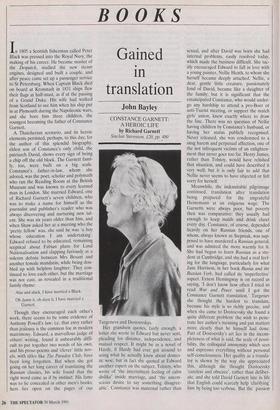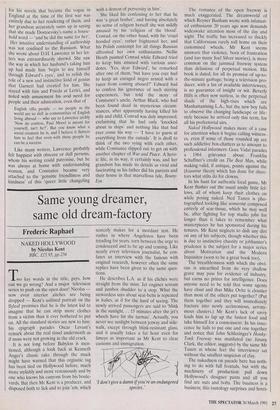BOOKS
Gained in translation
John Bayley
CONSTANCE GARNETT: A HEROIC LIFE by Richard Garnett
Sinclair Stevenson, £20, pp. 480
In 1805 a Scottish fisherman called Peter Black was pressed into the Royal Navy, the making of his career. He became master of the Despatch, studied the new steam engines, designed and built a couple, and after peace came set up a passenger service to St Petersburg. When Captain Black died on board at Kronstadt in 1831 ships flew their flags at half-mast, as if at the passing of a Grand Duke. His wife had walked from Scotland to see him when his ship put in at Plymouth during the Napoleonic wars, and she bore him three children, the youngest becoming the father of Constance Garnett.
A Thatcherian scenario, and its heroic elements persisted, perhaps, to this day; for the author of this splendid biography, eldest son of Constance's only child, the patriarch David, shows every sign of being a chip off the old block. The Garnett fami- ly, too, were built on a big scale. Constance's father-in-law, whom she adored, was the poet, scholar and polymath who ran the Reading Room at the British Museum and was known to every learned man in London. She married Edward, one of Richard Garnett's seven children, who was to make a name for himself as the journalist and publisher's reader who was always discovering and nurturing new tal- ent. She was six years older than him, and when Shaw asked her at a meeting who the `pretty fellow' was, she said he was 'a boy whose education I am undertaking'. Edward refused to be educated, remaining sceptical about Fabian plans for Land Nationalisation and clapping furiously at a solemn debate between Mrs Besant and another female mandarin, while being dou- bled up with helpless laughter. They con- tinued to love each other, but the marriage was not easy, as revealed in a traditional family rhyme:
Alas and alack, I have married a Black.
Oh damn it, oh darn it, I have married a Garnett.
Though they encouraged each other's work, there seems to be some evidence of Anthony Powell's law: i.e. that envy rather than jealousy is the common foe in modern matrimony. Edward, a marvellous judge of others' writing, found it unbearably diffi- cult to put together two words of his own, and his prose-poems and 'clever' little nov- els, with titles like The Paradox Club, have been long forgotten. But when she got going on her long career of translating the Russian classics, his wife found that the right word came as if by instinct. His fame was to lie concealed in other men's books; hers lies open on the pages of our
Turgenevs and Dostoevskys.
Her grandson quotes, fairly enough, a letter she wrote to Edward but never sent, pleading for distance, independence, and mutual respect. It might be in a novel of Hardy, if Hardy had ever got around to using what he actually knew about domes- tic woe; but in fact she quoted at Edward another expert on the subject, Tolstoy, who wrote of 'the intermittent feeling of calm dislike' inside marriage, and 'the uncon- scious desire to say something disagree- able'. Constance was maternal rather than sexual, and after David was born she had internal problems, easily resolved today, which made the business difficult. She tac- itly encouraged Edward to fall in love with a young painter, Nellie Heath, to whom she herself became deeply attached. Nellie, a dear, gentle little creature, passionately fond of David, became like a daughter of the family; but it is significant that the emancipated Constance, who would under- go any hardship to attend a pro-Boer or anti-Tsarist meeting, or support the match girls' union, knew exactly where to draw the line. There was no question of Nellie having children by Constance's husband, or having her status publicly recognised. Never released, she was condemned to a snug harem and perpetual affection, one of the not infrequent victims of an enlighten- ment that never goes too far. Henry James, rather than Tolstoy, would have relished that situation, and could have described it very well; but it is only fair to add that Nellie never seems to have objected or felt sorry for herself.
Meanwhile, the indomitable pilgrimage continued, translation after translation being prepared for the ungrateful Heinemann at an exiguous wage. The Garnetts were always poor, but poverty then was comparative: they usually had enough to keep maids and drink claret every day. Constance, of course, depended heavily on her Russian friends, one of whom, always known as Stepniak, was sup- posed to have murdered a Russian general, and was admired the more warmly for it. She had begun to learn Russian as a stu- dent at Cambridge, and she had a real feel- ing for the language, particularly for what Jane Harrison, in her book Russia and the Russian Verb, had called its 'imperfective' aspect. Ernest Hemingway is on record as saying, 'I don't know how often I tried to read War and Peace until I got the Constance Garnett translation.' Turgenev she thought the hardest to translate, because his style is so richly precise, and when she came to Dostoevsky she found a quite different problem: the wish to pene- trate her author's meaning and put matters more clearly than he himself had done. Part of Dostoevsky's art lies in the incom- pleteness of what is said, the scale of possi- bility, the colloquial anonymity which sees and expresses everything without personal self-consciousness. Her quality as a transla- tor is shown by the way she appreciated this, although she thought Dostoevsky `careless and obscure', rather than deliber- ate, and she told David Garnett late in life that English could scarcely help 'clarifying' him by being too verbose. But the passion
for his novels that became the vogue in England at the time of the first war was entirely due to her rendering of them, and her grandson accurately sums up in saying that she made Dostoevsky's name a house- hold word — 'and he did the same for her'. Her intuitive understanding of authorship was not confined to the Russians. What she wrote about D.H. Lawrence in her let- ters was extraordinarily shrewd. She saw the way in which her husband's taking him up had made him 'begin to see himself through Edward's eyes', and to relish the role of a new and instinctive kind of genius that Garnett had created for him. She stayed with him and Frieda at Lerici, and noted with amusement his avid need for people and their admiration, even that of
English villa people — no people in the world are so dull as communities of English living abroad — who say to Lawrence archly Now do confess, Paul Morel is meant for yourself, isn't he?'. But you know what a social creature he is, and I believe it flatters him to feel that even with these people he can be a success.
Like many writers, Lawrence probably felt happiest with obscure or dull persons, whom his writing could patronise, but he was always at home with understanding women, and Constance became very attached to the 'genuine friendliness and kindness' of this 'queer little changeling with a demon of perversity in him'.
She liked his confessing to her that he was 'a great bosher', and having absolutely no sense of religion herself she was mildly amused by his 'religion of the blood'. Conrad, on the other hand, with his 'cruel hooded eyes', rather frightened her, and his Polish contempt for all things Russian affronted her own enthusiasms. Nellie Heath painted Conrad while Edward tried to keep him amused with various anec- dotes. 'Yes, dear Edward', he remarked after one of them, 'but have you ever had to keep an enraged negro armed with a razor from coming aboard?' Edward had to confess his ignorance of such stirring experiences, but told the story of Constance's uncle, Arthur Black, who had been found dead in mysterious circum- stances, after apparently having killed his wife and child. Conrad was duly impressed, exclaiming that he had only 'knocked
about ships' and nothing like that had ever come his way — 'I have to guess at everything from the outside'. It is droll to think of the two vying with each other, while Constance slipped out to get on with another chapter of War and Peace. A hero- ic life, in its way, it certainly was, and her grandson has made its details as vivid and fascinating as his father did his parents and their house in that marvellous tale, Beany- Eye.



















































 Previous page
Previous page